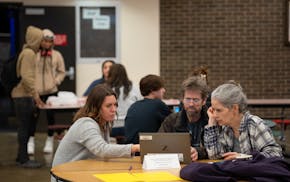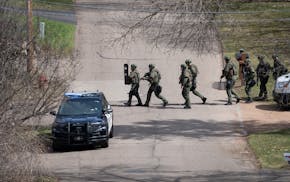A Minnesota man who became the first known American suicide bomber in Somalia was a reluctant holy warrior, according to Tuesday's testimony in the federal terrorism trial in Minneapolis.
Shirwa Ahmed of Minneapolis was leery about joining a terrorist group in his homeland, a fellow recruit testified. At first he tried to back out and later tried to leave, but was stopped by the terrorist leaders. In 2008 he died in one of five coordinated suicide bombings.
Salah Osman Ahmed was the second recruit to testify for the U.S. government in the trial of Mahamud Said Omar, 46, of Minneapolis. Omar faces five charges related to helping a terrorist organization and conspiring to kill and maim people overseas. He is accused of encouraging and giving money to some of the 20 or more Minnesota Somali men who left to fight in Somalia.
Salah Ahmed's account largely reinforced last week's testimony from Abdifatah Yusuf Isse. Both men, who've pleaded guilty in the case, said they were recruited at a Minneapolis mosque during the Muslim holy month of Ramadan in the fall of 2007 to go fight Ethiopian troops. They believed the Ethiopians, a traditional enemy, had invaded their homeland and were abusing the Somali people. When they got to Somalia, the men said, they realized that the group they joined was willing to engage in terrorism not only to rout the Ethiopians, but also to topple the weak Somali government.
The men found themselves embedded in Al-Shabab, designated a terrorist group by the U.S. State Department in February 2008.
The government's first two insiders portrayed the group as a poorly funded, loosely organized venture whose operations bore slight resemblance to the precision planning of Al-Qaida and similar terrorist groups.
But a third recruit had no trouble telling jurors that he went to Somalia to join Al-Shabab intending to kill anyone in its way.
"I was a foot soldier," said Kamal Said Hassan, 27, of Minneapolis. "Mujahadeen."
Hassan, dressed in bright orange sweats from the Sherburne County jail, testified for about 35 minutes and will return to the stand Wednesday.
'He was trapped'
Salah Ahmed told jurors that he pleaded guilty to providing support to help kill people overseas, but not to helping a foreign terrorist organization. He said that Shirwa Ahmed left a training camp in southern Somalia with the hopes of returning with him to the United States. But leaders of Al-Shabab had confiscated his passport and would not give it back, he said.
Salah Ahmed said he managed to escape the camp himself by telling Al-Shabab leaders that he needed to seek treatment for a rash in the nearby southern port city of Kismayo. Isse was also able to leave the camp with him.
"Shirwa wanted to come with us to Kismayo because he wanted to come to the United States, but they didn't let him," Salah Ahmed said. "Instead he went back to Mogadishu, so he was trapped."
He told jurors that while he was at an Al-Shabab safehouse in Somalia, a call came from Shirwa Ahmed, who was in Saudi Arabia at the time on a religious pilgrimage.
"He called and said, 'I'm not coming to Somalia. I spoke to some scholars in Mecca and they said whatever's going on in Somalia is not something that is good. ... I think you guys have been tricked,'" Salah Ahmed testified. He said another Minnesota recruit, Khalid Mohamed Abshir, and a woman at the safehouse known as Umma Shabab -- mother of Shabab -- got on the phone and persuaded Shirwa Ahmed to come.
Also at the safehouse, Salah Ahmed testified, was Omar, who had recruited the men. Ahmed said that Omar stayed at the safehouse for four to five days, that he offered to contribute $1,000 to buy two AK47 assault rifles for himself and another recruit, that he gave $500 in "pocket money" to a Minnesota recruit, and that he paid about $300 to the woman who ran the safehouse for expenses.
After Salah Ahmed returned safely to the United States, he said he learned from the media what had become of Shirwa Ahmed. FBI officials, using DNA samples and fingerprints, determined that Shirwa Ahmed died on Oct. 29, 2008, in northern Somalia in coordinated bombings that killed more than two dozen people and injured many more.
"I was thinking that he was the last person I ever would have thought who would do something like this," Salah Ahmed said. "Maybe he got forced, I don't know."
Jon Hopeman, one of Omar's lawyers, hammered Salah Ahmed repeatedly about lies he initially told the FBI. Hopeman noted that Salah Ahmed escaped a possible sentence of life-plus-68 years in prison by cutting a deal that caps his exposure at 15 years, and it could be reduced substantially by his cooperation.
"You yourself are a terrorist, aren't you?" Hopeman asked sternly.
"No, I'm not," Salah Ahmed said.
"A junior terrorist? Hopeman said. "Are you an assistant terrorist?"
"No," he responded.
"We didn't go for religion at first. We went for nationalism ... to shoot Ethiopians, not civilians."
"They're people, aren't they?" Hopeman said.
"Yes, they are," Salah Ahmed said. He said at the time, though, he understood that they had attacked Somalia and he believed he was protecting his country.
"Your country was here, wasn't it," Hopeman said.
"Yes," said Salah Ahmed, a naturalized U.S. citizen.
Allie Shah • 612-673-4488 Dan Browning • 612-673-4493

FAFSA completions in Minnesota drop amid flawed efforts to update form

Wisconsin Republicans ignore governor's call to spend $125M to combat 'forever chemicals'

Man killed in Minnetonka by law enforcement started gun battle with deputies, BCA says

